The Office of the Presidential Adviser on the Peace Process (OPAPP) is still in the process of getting other agencies in government to look into its draft Executive Order on the creation of the National Transitional Justice and Reconciliation Commission on the Bangsamoro (NTJRCB) before its submission to the Office of the President.
“It has to go through the process. There was already a drafted EO for the Commission but you know government, it has to go through the process. It’s not as simple as saying the President will sign immediately then it’s done. You have to merge and mesh gears with all agencies of government,” Dureza said in response to MindaNews’ query why it has taken so long for the government to set up the commission that would have helped President Rodrigo Duterte address the historical injustices against the Bangsamoro as he has repeatedly promised.
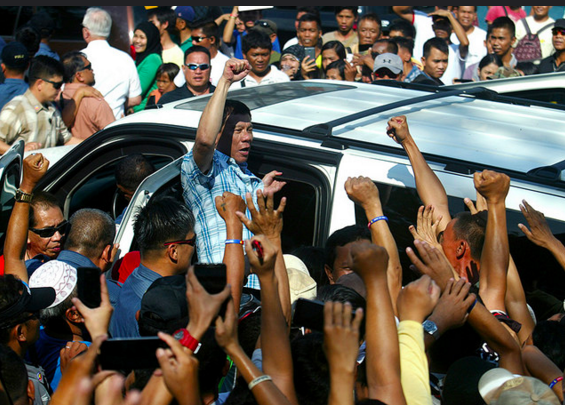
Davao CIty Mayor Rodrigo Duterte, the lone Mindanawon Presidentilal candidate, chants “Allahu Akbar” (Allah is Great) as he arrives at the venue of the Cotabato City rally on February 27, 2016. Duterte was warmly welcomed by the Moro people for whom he vowed his administration would “correct the historical injustices” done to them. MindaNews file photo by KEITH BACONGCO
During his sorties as candidate and even now as the country’s 16th President and the first Mindanawon to lead the nation, Duterte, whose grandmother was a Maranao, would invite his audience to travel back to 1521 with his lecture on Philippine history from the viewpoint of Mindanao, to help them understand what happened to the Bangsamoro.
Dureza told MindaNews that transitional justice work provides for quasi judicial bodies to be in place. “There is a need for some wrongdoings done during the time of conflict that there must be an acknowledgment of responsibility and sometimes in the other experiences in the other parts of the world like Colombia where I studied a little bit what they did, it may not be a traditional penal system that will be applied but there must be a way of acknowledging of guilt and responsibility by those who have committed certain atrocities. if you may call it, during the time of conflict. You have to exorcise these.”
Some of those who committed atrocities are still alive, MindaNews said, to which Dureza replied: “Many of them are alive, not only some. Many are alive.”
“You know, even their generals in Colombia have gone to the extent of acknowledging responsibility,” Dureza said adding that could happen here although he has not yet discussed the matter with them. “That’s why the proposed EO will have to go through the rounds, it will go through all the agencies, some will be affected.”
7-member Commission
As recommended by the Transitional Justice and Reconciliation Commission (TJRC), the NTJRCB shall be composed of seven members appointed by the President, five of whom are voting members — the Chairperson and the four Commissioners, who are responsible for convening the Sub-Commissions – while two representatives of Bangsamoro civil society “are members of the NTJCRB with a status of ex officio, non-voting members.”
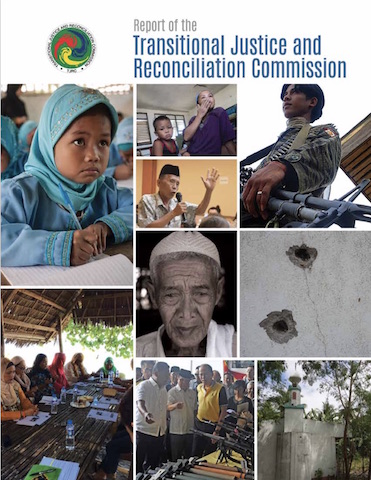
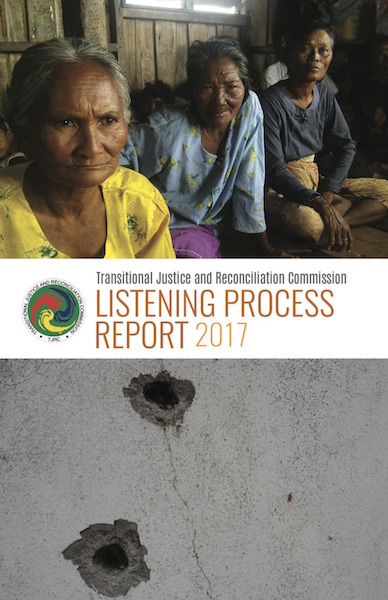
As proposed, the NTJRC shall operate for six years “with the possibility of extending its mandate for another three years” and shall have four sub-commissions: Historical Memory; Against Impunity, for the Promotion of Accountability, and Rule of Law; Land Dispossession; and Healing and Reconciliation.
The TJRC was an independent body set up by the Philippine government (GPH) and the Moro Islamic Liberation Front (MILF) in 2014 “to undertake a study and to make recommendations with a view to promoting healing and reconciliation among the different communities affected by the conflict in Mindanao and the Sulu archipelago.”
It was mandated to propose appropriate mechanisms to address legitimate grievances of the Bangsamoro people, correct historical injustices, address human rights violations, including marginalization through land dispossession, and make recommendations with a view to promote healing and reconciliation of the different communities that have been affected by the conflict.
Transitional justice is part of the Annex on Normalization of the Comprehensive Agreement on the Bangsamoro (CAB) signed between the Philippine government and the Moro Islamic Liberation Front on March 27, 2014.
The UN Secretary General in its 2004 report defines ‘transitional justice’ as the “full range of processes and mechanisms associated with a society’s attempt to come to terms with a legacy of large-scale abuses committed in the past” in order to achieve accountability, serve justice, and achieve reconciliation.”

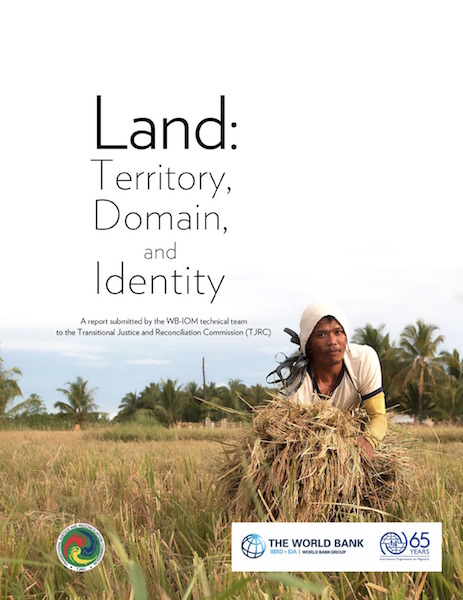
The UN report also describes the mechanisms of transitional justice in more specific terms; it employs “both judicial and non-judicial mechanisms, including individual prosecutions, reparations, truth-seeking, institutional reform, vetting and dismissals, or a combination thereof.”
Transitional Justice ensures the need to deal with the past in order to build the future, to address historical injustices in order to make new history.
Inter-generational
The TJRC report concluded that the Bangsamoro narrative of historical injustice is “based on an experience of grievances that extends over generations” and is a result of three interlocking phenomena – violence, impunity, and neglect- which in turn are rooted in the imposition “by force” of a monolithic Filipino identity and Philippine State “on multiple ethnic groups in Mindanao and the Sulu archipelago that saw themselves as already pre-existing nations and nation-states.”
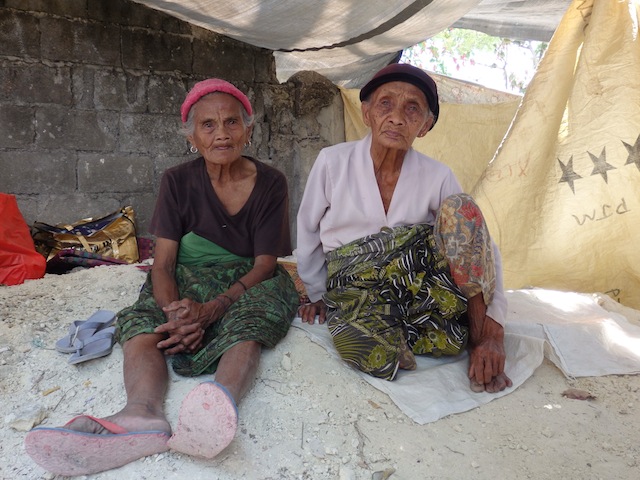
NEVER-ENDING. Sisters Saria Namayo (left) and Cartiquia Cartin (right) of Barangay Elian, Datu Saudi Ampatuan, have lived a life of never-endng evacuations such as this in March 2015. Their children and grandchildren have also experienced several mass evacuations due to armed conflict. MindaNews file photo by CAROLYN O ARGUILLAS
Historical injustice across generations was cited “particularly with respect to land dispossession and its adverse effects upon their welfare as a community as well as their experience of widespread and serious human rights violations”
“We are now in the process of submitting to the President … a proposed EO that will already institutionalize the commission on transitional justice,” Dureza told MindaNews in a sit-down interview on April 20.
He said in any peacemaking work worldwide, “there are certain issues that will have to be tackled and it is more of removing the trauma that conflict has brought to the people so it is very important that a transitional justice set up must have to be installed even early on because it helps also exorcise many of the maladies that take place in a conflict situation.”
Dureza said they’re taking a “serious look at (the TJRC) recommendations but we’d like to also see what, because some of those will not work here. Those that may work in Colombia may not work here or vice versa those that work here cannot work in Colombia. So right now, in fact there’s an effort now to take a look at the best practices or bad practices in other areas so we learn from them.”
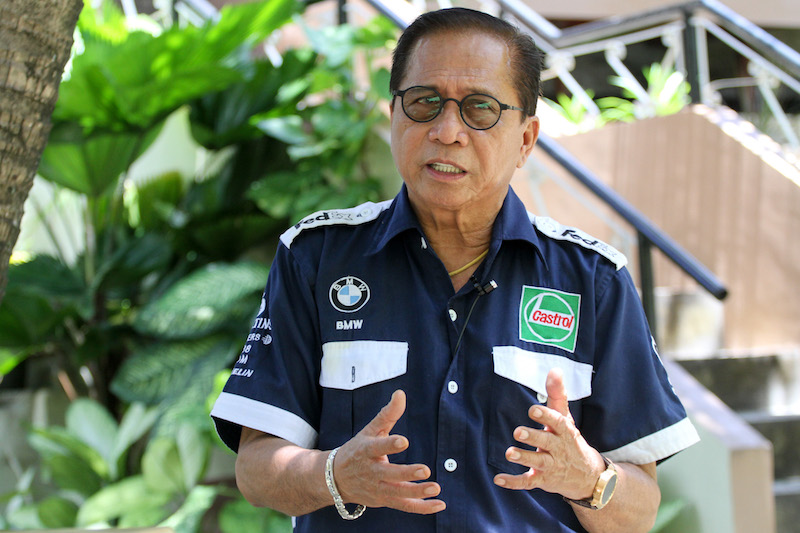
Presidential Adviser on the Peace Process Jesus Dureza says his office is still in the process of getting other agencies of government to look into its draft EO on the creation of a National Transitional Justice and Reconciliation Commission. MindaNews photo by MANMAN DEJETO
“Kaya sabi ko nga eh, dapat walang … hindi tayo masyadong magmamadali. It’s … one step at a time, building on it but if we wish that is going to happen immediately, then it may even result to more disastrous effect because there will be no acceptance. It’s very important that when you process and set up a new commission, although it has its own mandate, it may have to go through the process of people to understand why and it takes a lot of work to engage, especially the stakeholders. That’s why we are still in the process of still meeting and organizing the peace tables – the different peace tables – because some of those things that we download to them is this idea of transitional justice commission.”
Aside from the recommendations to create the NTJRCB, 88 specific recommendations were also made by the TJRC arising from the Consultation Process, particularly the Listening Process.
The recommendations were addressed to specific agencies such as the Office of the President, the military, police, the Commission on Human Rights, OPAPP, Congress and other agencies as well as the “future Bangsamoro authorities.”
http://www.mindanews.com/peace-process/2017/04/opapp-still-in-the-process-of-submitting-proposed-eo-on-transitional-justice/

No comments:
Post a Comment
Note: Only a member of this blog may post a comment.